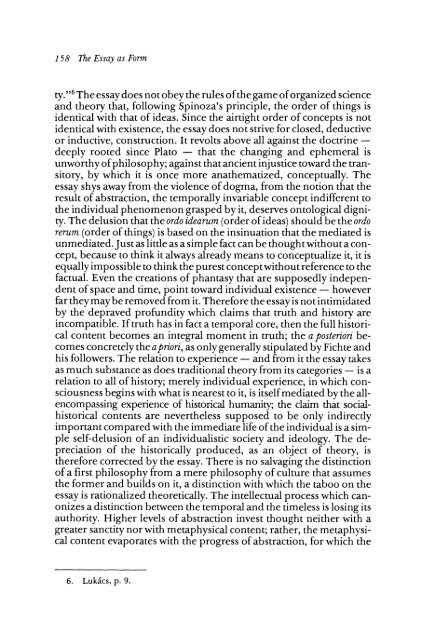Adorno-The-Essay-As-Form
Adorno-The-Essay-As-Form
Adorno-The-Essay-As-Form
You also want an ePaper? Increase the reach of your titles
YUMPU automatically turns print PDFs into web optimized ePapers that Google loves.
158 <strong>The</strong> <strong>Essay</strong> as Fonnty."6<strong>The</strong>essay does not obey the rules ofthe game of organized scienceand theory that, following Spinoza's principle, the order of things isidentical with that of ideas. Since the airtight order of concepts is notidentical with existence, the essay does not strive for closed, deductiveor inductive, construction. It revolts above all against the doctrine -deeply rooted since Plato - that the changing and ephemeral isunworthy of philosophy; against that ancient injustice toward the transitory,by which it is once more anathematized, conceptually. <strong>The</strong>essay shys away from the violence of dogma, from the notion that theresult of abstraction, the temporally invariable concept indifferent tothe individual phenomenon grasped by it, deserves ontological dignity.<strong>The</strong> delusion that theordo idearum (order of ideas) should be theordorerum (order of things) is based on the insinuation that the mediated isunmediated. Just as little as a simple fact can be thought without a concept,because to think it always already means to conceptualize it, it isequally impossible to think the purest conceptwithout reference to thefactual. Even the creations of phantasy that are supposedly independentof space and time, point toward individual existence - howeverfar they may be removed from it. <strong>The</strong>refore the essay is not intimidatedby the depraved profundity which claims that truth and history areincompatible. If truth has in fact a temporal core, then the full historicalcontent becomes an integral moment in truth; the a posteriori becomesconcretely the apriori, as only generally stipulated by Fichte andhis followers. <strong>The</strong> relation to experience - and from it the essay takesas much substance as does traditional theory from its categories - is arelation to all of history; merely individual experience, in which consciousnessbegins with what is nearest to it, is itself mediated by the allencompassingexperience of historical humanity; the claim that socialhistoricalcontents are nevertheless supposed to be only indirectlyimportant compared with the immediate life of the individual is a simpleself-delusion of an individualistic society and ideology. <strong>The</strong> depreciationof the historically produced, as an object of theory, istherefore corrected by the essay. <strong>The</strong>re is no salvaging the distinctionof a first philosophy from a mere philosophy of culture that assumesthe former and builds on it, a distinction with which the taboo on theessay is rationalized theoretically. <strong>The</strong> intellectual process which canonizesa distinction between the temporal and the timeless is losing itsauthority. Higher levels of abstraction invest thought neither with agreater sanctity nor with metaphysical content; rather, the metaphysicalcontent evaporates with the progress of abstraction, for which the6. Lukics, p. 9.


